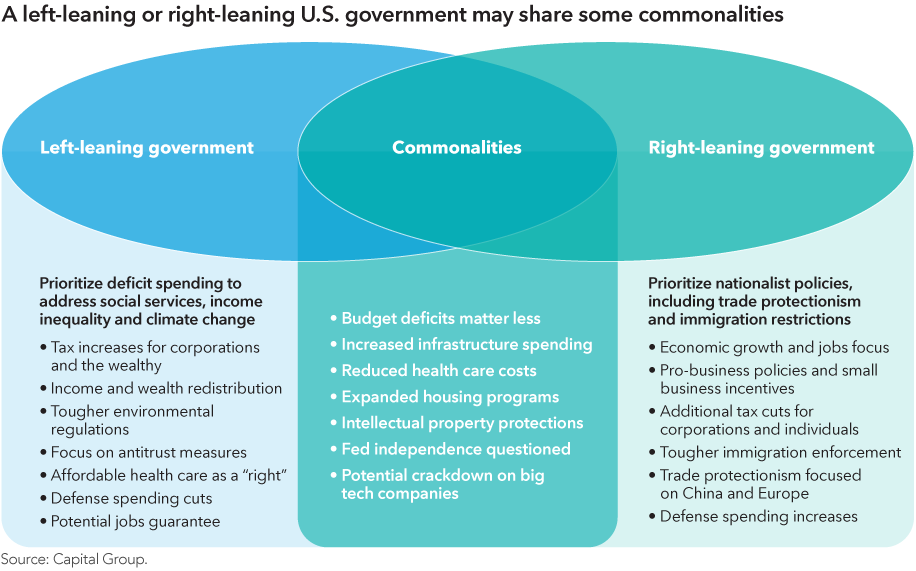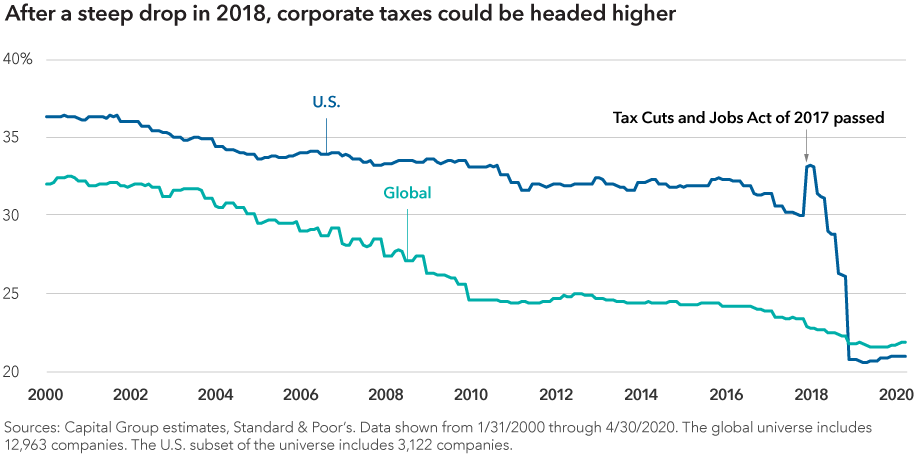U.S. Equities
Politics
- Significant U.S. policy changes are on the horizon, regardless of which party prevails in November.
- Despite the divisive rhetoric, the American political left and right have some key priorities in common.
- Infrastructure spending, lower health care costs and higher wages are largely bipartisan issues.
Roughly six weeks ahead of pivotal U.S. elections, one thing is becoming increasingly clear: Profound policy changes are on the horizon no matter which political candidates prevail.
Certain critical issues facing the nation — income inequality and rising health care costs, for instance — have reached an inflection point where Democrats and Republicans alike are proposing solutions that would have been politically untenable just a few years ago. The only questions, in my view, are how quickly policy changes will come, whether they will be sweeping or incremental, and how they will affect the U.S. economy and markets.
With those questions in mind, a multidisciplinary research team at Capital Group recently took a deep dive into the issues and reached some initial conclusions, including:

- In the long-running conflict between labor and ownership, the political pendulum is swinging toward labor, but the strength of the turn may not be as strong as investors envision. Despite intensifying societal imbalances exposed by the COVID-19 outbreak, there are plenty of crosscurrents that could and probably will slow that momentum.
- Some key issues — such as affordable health care, higher paying jobs and addressing the nation’s deteriorating infrastructure — are not solely a focus of the American political left. The right will also likely pursue these important goals, but with broadly different policy tools.
- Both parties have crossed the Rubicon of fiscal conservatism in the pandemic era. Large deficit spending will almost certainly continue regardless of which party is in power. However, the opposition party may find a return to fiscal restraint politically useful after the November 3rd elections.
Three areas of agreement
COVID economic recovery. If COVID-19 is not contained and there is no pandemic-ending vaccine, the 2021 legislative agenda will focus on economic recovery. Depending on the path of the pandemic, additional stimulus bills could be on the way, along with other fiscal and monetary stimulus measures. To underscore how much the political lines have blurred, a GOP senator in April proposed that the federal government cover up to 80% of wages for all employees of U.S. businesses impacted by state-imposed lockdowns. More unconventional approaches may be necessary in the event of another COVID wave next year.
U.S.-China trade tensions. Largely viewed as a Trump-induced conflict, U.S.-China trade tensions wouldn’t miraculously disappear under a Biden administration. A growing bipartisan consensus in Washington views a tense U.S.-China relationship as a long-term reality that will shape trade and foreign policy decisions for many years to come. One area of broad agreement is the need for greater protections for intellectual property, which is likely to be a high priority under a Democratic or a Republican administration.
Technology regulations. Both parties have expressed frustrations with Big Tech companies, raising the prospect of antitrust actions, tougher regulations and greater oversight in the areas of privacy protection and suppression of political viewpoints. A breakup of perceived tech monopolies might be more likely under a left-leaning government, but there are supporters of this move on both sides of the political aisle.
Four areas of disagreement
Tax policy. Taxation is undoubtedly the biggest source of disagreement, with Democrats proposing higher income taxes for corporations and wealthy individuals, along with a capital gains tax increase, and Republicans arguing for deeper tax cuts as a follow-up to the Tax Cuts and Jobs Act of 2017. On the political left there is also strong support for increasing the federal minimum wage, while the right may prefer to limit low-wage immigration as a way to boost employees’ wages.
Education. Attempts to solve education inequality are highly partisan, and we are likely to see drastically different paths under a Democratic or Republican administration. A right-leaning government would favor school choice initiatives and reducing the influence of teachers’ unions, while a left-leaning government would likely pursue greater investments in public schools, early childhood development and student debt relief.
Immigration. Another highly partisan issue, immigration policy is likely to undergo major change if Democrats win the White House and the Senate. We could see an easier path to citizenship for an estimated 11 million undocumented immigrants living in the U.S., along with expanded protections for asylum seekers. A Republican administration would likely continue to increase border security and seek to limit low-wage immigration.
Supreme Court. With the passing of Supreme Court Justice Ruth Bader Ginsburg, a new issue has emerged that could dramatically change the dynamics of the election. The appointment of Ginsburg’s replacement is likely to be a defining issue as we enter the final weeks of the 2020 election cycle.

Investment implications
Equities. Equity markets are likely to continue benefiting from a low interest rate environment under all four likely election scenarios — Trump wins and the Senate remains in Republican control; Trump wins and Democrats take the Senate; Biden wins and Democrats take the Senate; Biden wins and Republicans maintain Senate control. Growth-oriented stocks are particularly attractive with rates at historic lows. However, periods of extreme volatility should be expected given the economic uncertainty that prompted central banks to pursue zero- and negative-rate policies in the first place.
Fixed income. 10-year U.S. Treasury bond yields are likely to remain in the range of 0.5% to 1.5% under three of the four scenarios. The exception could be the so-called “blue wave” scenario — Biden wins the White House and Democrats take the Senate — in which case, bond yields could move higher (1.5% to 2.0%) as a Democratic administration finds it easier to advance its policy agenda, potentially boosting U.S. economic growth in the process.
Sector impacts. Broadly speaking, sectors and companies that stand to benefit from the substantial political change of a blue wave include health care plan operators, environmentally focused companies (solar, wind, electric, etc.), discount retailers and small technology firms. A right-leaning government would likely foster a relatively more favorable environment for pharmaceutical companies, U.S.-based manufacturing companies and the energy industry.
.png)
That said, it’s important to remember that attempting to time the markets based on expected political outcomes has proven to be an extremely difficult task. History has shown that long-term investors are better served by staying invested — even during times of substantial political volatility — as markets have tended to power through even the most tumultuous election cycles.
Standard & Poor’s 500 Composite Index is a market capitalization-weighted index based on the results of approximately 500 widely held common stocks.
Standard & Poor’s 500 Composite Index (“Index”) is a product of S&P Dow Jones Indices LLC and/or its affiliates and has been licensed for use by Capital Group. Copyright © 2020 S&P Dow Jones Indices LLC, a division of S&P Global, and/or its affiliates. All rights reserved. Redistribution or reproduction in whole or in part is prohibited without written permission of S&P Dow Jones Indices LLC.
Our latest insights
-
-
Technology & Innovation
-
Long-Term Investing
-
Long-Term Investing
-
U.S. Equities
RELATED INSIGHTS
Never miss an insight
The Capital Ideas newsletter delivers weekly insights straight to your inbox.
 Jared Franz
Jared Franz